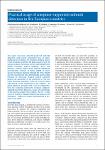Practical usage of computer-supported outbreak detection in five European countries
Hulth, Anette
Andrews, Nick
Ethelberg, Steen
Dreesman, Johannes
Faensen, Daniel
Pelt, Wilfrid van
Schnitzler, Johannes
This paper discusses computer-supported outbreak detection using routine surveillance data, as implemented at six institutes for infectious disease control in five European countries. We give an overview of the systems used at the Statens Serum Institut (Denmark), Health Protection Agency (England, Wales and Northern Ireland), Robert Koch Institute (Germany), Governmental Institute of Public Health of Lower Saxony (Germany), National Institute for Public Health and the Environment (the Netherlands) and Swedish Institute for Infectious Disease Control (Sweden). Despite the usefulness of the algorithms or the outbreak detection procedure itself, all institutes have experienced certain limitations of the systems. The paper therefore concludes with a list of recommendations for institutes planning to introduce computer-supported outbreak detection, based on experiences on the practical usage of the systems. This list – which concerns usability, standard operating procedures and evaluation – might also inspire improvements of systems in use today.
Files in this item
No license information
Related Items
Show related Items with similar Title, Author, Creator or Subject.
-
2014-04-10ZeitschriftenartikelResults of surveillance for infections with Shiga toxinproducing Escherichia coli (STEC) of serotype O104:H4 after the large outbreak in Germany, July to December 2011 Frank, Christina; Milde-Busch, Astrid; Werber, DirkAfter the massive outbreak of infections with Shiga toxin-producing Escherichia coli (STEC) of serotype O104:H4 in Germany in the summer of 2011, post-outbreak surveillance for further infections with this type of STEC was ...
-
2015-08-27ZeitschriftenartikelTransmission patterns of human enterovirus 71 to, from and among European countries, 2003 to 2013 Hassel, C.; Mirand, A.; Lukashev, A.; Terletskaia-Ladwig, E.; Farkas, A.; Schuffenecker, I.; Diedrich, Sabine; Huemer, H. P.; Archimbaud, C.; Peigue-Lafeuille, H.; Henquell, C.; Bailly, J.Enterovirus 71 (EV-71) is involved in epidemics of hand, foot, and mouth disease (HFMD) and has been reported to occur with severe neurological complications in eastern and south-east Asia. In other geographical areas, the ...
-
2015-06-24ZeitschriftenartikelEbola Virus Disease Outbreak in Isiro, Democratic Republic of the Congo, 2012: Signs and Symptoms, Management and Outcomes Kratz, Thomas; Roddy, Paul; Oloma, Antoine Tshomba; Jeffs, Benjamin; Ciruelo, Diana Pou; Rosa, Olimpia de la; Borchert, MatthiasData collected during the 2012 Ebola virus disease (EVD) epidemic in the Democratic Republic of the Congo were analysed for clinical signs, symptoms and case fatality of EVD caused by Bundibugyo virus (BDBV), establishment ...

